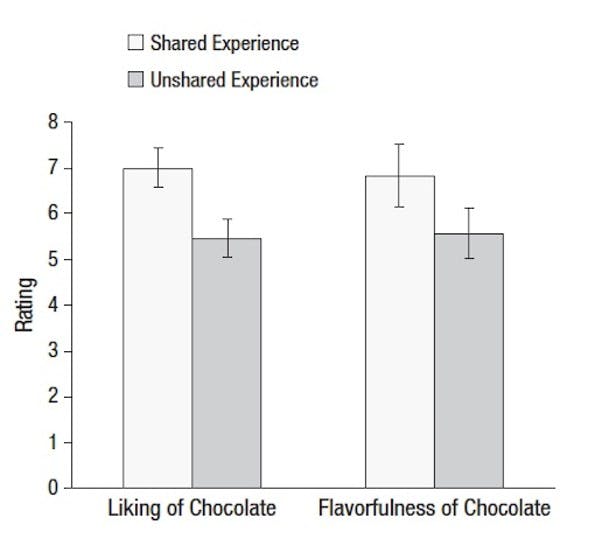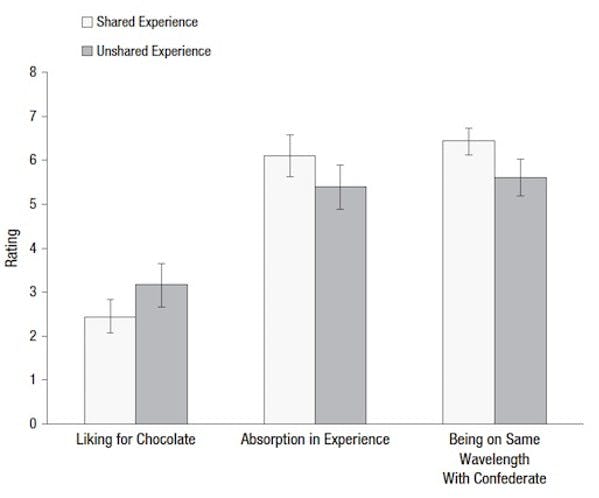If you’ve ever felt like a killjoy when turning down a drink or a dessert, new research may confirm your fear. It’s not just yourself you’re depriving; you may actually make the experience less fun for companions who do indulge. This effect is so strong that even if the person you’re with is a total stranger and you’re both sitting in silence, whether or not you’re participating in an activity can make a meaningful difference in the amount of pleasure your companion gets out it.
A team of Yale psychologists, led by graduate student Erica Boothby, demonstrate this effect in a new paper in the journal Psychological Science. Boothby, along with a pair of professors—Margaret Clark and John Bargh—recruited 23 undergraduate students to take part in her experiment. When each student arrived at the lab, she was met by a confederate, who—posing as another participant—chatted with her for a few minutes. The confederate and participant then sat at a table, side by side, without speaking, for the remainder of the experiment; the confederate had been told to act “stoic.”
The participants were asked to taste two pieces of chocolate (both pieces were actually taken from the same bar of 70 percent dark); during each taste test, the confederate would either try the chocolate alongside the participant (the “shared experience” condition) or look through a booklet of paintings (the “unshared experience” condition). Participants spent about a minute tasting the chocolate, and then answered a series of questions about their state of mind and the experience they’d just had. They were asked to rank, on a scale of 0 to 10, how much they liked the chocolate; how flavorful it was; how intense; how much they would pay for a bar of it; how absorbed they felt in the experience of eating it; and how they felt at that moment, on a scale of 0 (“not at all good”) to 10 (“very good”). They also answered several questions about their impressions of the confederate: “Do you feel like you and the other participant are on the same wavelength?” “How much do you like the other participant?” “How much do you trust the other participant?”
On average, the participants’ ratings indicated that they strongly preferred the chocolate they ate in the “shared condition” to the chocolate they ate in the “unshared condition.” They also believed it tasted more flavorful. However, they didn’t believe their experience had anything to do with the other person’s activity or presence: When asked, on a scale of 0 to 6, to what extent they felt like the other participant had influenced their ratings of the chocolate, nearly three-quarters replied with a “0.” The average was a 0.46.

Still, the experiment’s results indicated that the already enjoyable experience of eating a piece of chocolate became even more pleasurable if a silent confederate did the same. But was this because sharing an activity with another person is inherently enjoyable, or because sharing it amplifies the experience? Does an unpleasant activity seem even less pleasant when experienced alongside another person, or does sharing the experience alleviate some of the unpleasantness? Boothby, Bargh, and Clark designed a follow-up experiment to find out.
The second experiment followed almost the same design as the first, except that the chocolate—90 percent dark—was unpleasantly strong, and the confederates viewed booklets of calculators, rather than artworks, in the unshared condition. This time, the participants rated the chocolate as much less enjoyable when the confederate was also eating it.

It’s not that everything is more fun with company, then. Rather, participants in the shared condition reported feeling more absorbed in the experience, and were also more likely to believe that the confederate was “on the same wavelength.” As the authors explain: “Sharing an experience might lead people naturally to think more about the contents of each other’s minds, a phenomenon called mentalizing, and this might increase the impact of the shared stimulus.”
